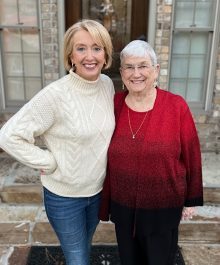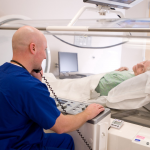I know that most of us don’t want to even think about colon cancer, much less read about it. But I’ve seen this type of cancer up close and personal now. My mom was diagnosed last year. So I’ve seen what it can do and how difficult the treatments can be.
 Ever since my mom’s diagnosis, I’ve been bugging my friends and other family members to suck it up and get a colonoscopy done, especially if they’ve never had one or they are overdue for the next one. (My mom had regular colonoscopies over the years, and her most recent exam found a mass in her colon which was then removed. She had no symptoms.) So far, I’m up to 4 family members and friends who got the all-important colonoscopy after I wouldn’t shut up about it. They all had clear test results. Woo-hoo!
Ever since my mom’s diagnosis, I’ve been bugging my friends and other family members to suck it up and get a colonoscopy done, especially if they’ve never had one or they are overdue for the next one. (My mom had regular colonoscopies over the years, and her most recent exam found a mass in her colon which was then removed. She had no symptoms.) So far, I’m up to 4 family members and friends who got the all-important colonoscopy after I wouldn’t shut up about it. They all had clear test results. Woo-hoo!
One of the things I learned from my mom’s oncologist is that colon cancer rates are going up — especially among younger generations. Please don’t make the mistake of thinking that colon cancer only happens to “old” people. It can happen at any age and is being diagnosed more and more in people in their 30s and 40s.
We all know colonoscopies aren’t the most pleasant experience, but please don’t let that stop you from getting a test that could save the life of your kids’ mother or father. If you won’t do it for yourself, do it for your kid who needs their parent. It’s only a one and a half-day process (the prep and the test itself), and it’s not as bad as you probably assume. I’m as squeamish as they come, so please know that if I can do it, literally anyone can. The peace of mind of knowing you’re okay is so very worth it.
If you’re in your 20s and don’t have any symptoms, please bug your parents about it until they get their screenings done. But if you do have any of the following symptoms, please tell your doctor, and don’t dismiss it as something that will get better on its own, especially if symptoms continue for several weeks.
Common symptoms of colon cancer: (from the Mayo Clinic website)
- A change in bowel habits, such as more frequent diarrhea or constipation.
- Rectal bleeding or blood in the stool.
- Ongoing discomfort in the belly area, such as cramps, gas or pain.
- A feeling that the bowel doesn’t empty all the way during a bowel movement.
- Weakness or tiredness.
- Losing weight without trying.
Below are some links to the latest facts, studies and numbers about the increasing rates of colon cancer happening at younger ages. Ask your family members to find out if direct relatives have had polyps removed in the past. If so, it might mean that you need a colonoscopy sooner than age 45.
Colon Cancer: What Millenials and Gen Zers Need to Know (Yale Medicine website)
Colon Cancer Rates Have Been Rising for Decades in Younger People (NBC News)
Study: Colorectal Cancer Rates Rising Rapidly Among Children and Teens (Health.com website)





